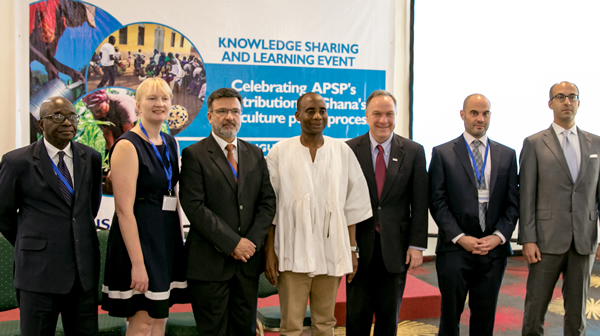 The United States of America is partnering with the Republic of Ghana to promote agricultural sector growth in support of its vision of “Ghana beyond Aid.” Through the U.S. Agency for International Development’s (USAID) Feed the Future Initiative, the U.S. hosted a knowledge sharing and lessons learned forum on August 15, 2018 atthe Swiss Spirit Alisa Suites &Hotel in Accra.The forum discussed USAID’s results, experiences, and best practices to strengthen Ghana’s agricultural sector.
The United States of America is partnering with the Republic of Ghana to promote agricultural sector growth in support of its vision of “Ghana beyond Aid.” Through the U.S. Agency for International Development’s (USAID) Feed the Future Initiative, the U.S. hosted a knowledge sharing and lessons learned forum on August 15, 2018 atthe Swiss Spirit Alisa Suites &Hotel in Accra.The forum discussed USAID’s results, experiences, and best practices to strengthen Ghana’s agricultural sector.
Deputy Minister of Food and Agriculture responsible for Annual Crops, the Honorable Dr. SagreBambangi, and Acting USAID/Ghana Mission Director, Steven E. Hendrix, opened the event lauding the cooperation between both nations. Mr. Hendrix shared that Ghana’s commitment to move the nation beyond aid is shared by the United States. He said, “We believe that two mutually-reinforcing factors determine a country’s self-reliance. The first is commitment. This is the degree to which a country’s laws, policies, actions, and informal governance mechanisms — such as cultures and norms — support progress towards self-reliance. Second, capacity: how far a country has come in its journey across the dimensions of political, social, and economic development, including the ability to work across these sectors.”
As Ghana increases its commitment and capacity to plan, finance, and manage its own development, its level of self-reliance should also increase. Country leadership is essential to achieving Feed the Future’s objectives and a core principle of Sustainable Development Goals. Evidence-driven and transparent policy agendas, capable and accountable institutions, and adequate public and private resources provide the foundation for country leadership.
Under the U. S. Government’s new Global Food Security Strategy, USAID will continue efforts to strengthen country leadership and commitment to food security and looks forward to a continued strong partnership with the Government of Ghana, private sector, academia, and civil society to reduce poverty, hunger, and malnutrition through agriculture-led growth, resilience, and nutrition.
Credit: US Embassy, Ghana























